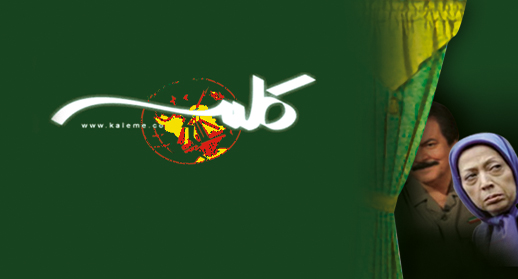| Reports about the detention of opposition leaders by the Iranian government are false and have been fabricated and released by the members of the terrorist Mojahedin-e Khalq Organization (MKO) in a move to stir unrests in Iran, reliable sources said Tuesday. |

Reports about the detention of opposition leaders by the Iranian government are false and have been fabricated and released by the members of the terrorist Mojahedin-e Khalq Organization (MKO) in a move to stir unrests in Iran, reliable sources said Tuesday.
http://english.farsnews.com/newstext.php?nn=8912101241
Jodashodegan website, a website affiliated to the defected members of the MKO, quoted sources privy to MKO headquarters in Paris as saying that the reports have been fabricated by the MKO's intelligence agents who have infiltrated into the overseas branch of the opposition movement led by Mir-Hossein Mousavi and Mehdi Karroubi.
The Karroubi and Mousavi-led unrests originally started after President Mahmoud Ahmadinejad was re-elected as the next president of the country with over 62% percent of the votes cast in Iran's 10th presidential election in 2009. Both Karroubi and Mousavi have been top officials of the Islamic Republic for year.
The website said that several MKO elements have also established a phone contact with the Persian-language Kalame website and tried to fool the website. Disguised as discontent officials of the Islamic Republic, the MKO agents claimed that the Tehran government has arrested both Karroubi and Mousavi.
Minutes after the false report was released by Kalame website, an Iranian judicial official rejected the claim that Mousavi and Karroubi were moved to Tehran's Heshmatieh prison. The official told FNA that the two men are currently in their houses and Iranian authorities have restricted their contacts merely with some suspected elements.
The MKO has sought hard to misuse the occasion after the February unrests in Tehran to practice its seditious plots against the Islamic Republic.
Late in February, sources close to the MKO informed that the terrorist organization had played a key role in the February 14 unrests in the Iranian capital.
The Habilian Association, an Iran-based human rights group formed by the family members of the Iranian victims of terrorism, quoted reliable sources as saying that MKO's surrogate ringleader Maryam Rajavi had dispatched several operational teams to Tehran and had been in constant contact with the team members until the end of unrests.
Several groups of seditionists staged riots in western Tehran on February 14. Rioters damaged public amenities and private buildings and properties and set up roadblocks by setting fire on garbage cans during the rush hour in the Iranian capital. Rioters opened fire at the public and police troops, killing one university student on the scene and wounding 9 more. One of those wounded in the incident also died at the hospital. Tehran's police tried to disperse the rioters, but did not reciprocate the gunfire. Police officials later announced that most of those wounded in the incident were security and police troops.
The MKO, whose main stronghold is in Iraq, is blacklisted by much of the international community, including the United States. Before an overture by the EU, the MKO was on the European Union's list of terrorist organizations subject to an EU-wide assets freeze. Yet, the MKO puppet leader, Maryam Rajavi, who has residency in France, regularly visited Brussels and despite the ban enjoyed full freedom in Europe.
The MKO is behind a slew of assassinations and bombings inside Iran, a number of EU parliamentarians said in a recent letter in which they slammed a British court decision to remove the MKO from the British terror list. The EU officials also added that the group has no public support within Iran because of their role in helping Saddam Hussein in the Iraqi imposed war on Iran (1980-1988).
Many of the MKO members abandoned the terrorist organization while most of those still remaining in the camp are said to be willing to quit but are under pressure and torture not to do so.
A May 2005 Human Rights Watch report accused the MKO of running prison camps in Iraq and committing human rights violations. According to the Human Rights Watch report, the outlawed group puts defectors under torture and jail terms. The group, founded in the 1960s, blended elements of Islamism and Stalinism and participated in the overthrow of the US-backed Shah of Iran in 1979. Ahead of the revolution, the MKO conducted attacks and assassinations against both Iranian and Western targets.
Leaders of the group have been fighting to shed its terrorist tag after a series of bloody anti-Western attacks in the 1970s, and nearly 30 years of violent struggle against the Islamic Republic of Iran.
The group started assassination of the citizens and officials after the revolution in a bid to take control of the newly established Islamic Republic. It killed several of Iran's new leaders in the early years after the revolution, including the then President, Mohammad Ali Rajayee, Prime Minister, Mohammad Javad Bahonar and the Judiciary Chief, Mohammad Hossein Beheshti who were killed in bomb attacks by MKO members in 1981.
The group fled to Iraq in 1986, where it was protected by Saddam Hussein and where it helped the Iraqi dictator suppress Shiite and Kurd uprisings in the country.
The terrorist group joined Saddam's army during the Iraqi imposed war on Iran (1980-1988) and helped Saddam and killed thousands of Iranian civilians and soldiers during the US-backed Iraqi imposed war on Iran.
Since the 2003 US invasion of Iraq, the group, which now adheres to a pro-free-market philosophy, has been strongly backed by neo-conservatives in the United States, who also argue for the MKO to be taken off the US terror list.
Related topics
Source Reveals MKO's Pivotal Role in Tehran's Monday Unrests
